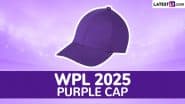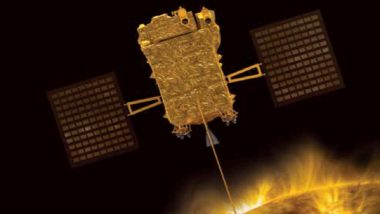Mumbai, August 28: After the resounding success of Chandrayaan 3, India's third mission to the moon, the Indian Space Research Organisation (ISRO) will launch the Aditya-L1 mission on September 2. Aditya-L1 Mission will be India's first space-based Indian observatory to study the sun. ISRO announced the Aditya-L1 mission's launch today, August 28. "The launch of Aditya-L1, the first space-based Indian observatory to study the Sun, is scheduled for September 2, 2023, at 11:50 Hrs. IST from Sriharikota," ISRO said.
With India still basking in the success of Chandrayaan 3 after the Vikram lander made a successful landing on the moon's lunar surface, ISRO's Aditya-L1 mission will be the next big step for the space agency and India. While the space agency continues bringing laurels to the nation, let's learn more about ISRO's next mission - the Aditya-L1. Aditya-L1 Mission Launch Date: After Chandrayaan 3 Success, ISRO to Launch First Space-Based Indian Observatory to Study Sun on September 2.
Aditya-L1 Launch Date and Time
🚀PSLV-C57/🛰️Aditya-L1 Mission:
The launch of Aditya-L1,
the first space-based Indian observatory to study the Sun ☀️, is scheduled for
🗓️September 2, 2023, at
🕛11:50 Hrs. IST from Sriharikota.
Citizens are invited to witness the launch from the Launch View Gallery at… pic.twitter.com/bjhM5mZNrx
— ISRO (@isro) August 28, 2023
What Is Aditya-L1 Mission?
The Aditya L1 mission, or Aditya L1 as ISRO calls it, will be the first space-based Indian mission to study the Sun and will be launched by PSLV-C57 rocket. As per the space agency, the Adiya L1 spacecraft will be placed in a halo orbit around the Sun-Earth system's Lagrange point 1 (L1). Notably, the L1 point of the Sun-Earth system is about 1.5 million km from the Earth. The Aditya-L1 mission will be India and ISRO's first space-based Indian observatory mission to study the sun.
Know Date and Time When ISRO Will Launch Aditya-L1 Mission
When Will ISRO Launch Aditya-L1 Mission?
ISRO will launch the Aditya-L1 mission to study the moon on Saturday, September 2. The mission will be launched at 11:50 hours from Sriharikota in Andhra Pradesh. Regarding the Aditya-L1 Mission, ISRO Chief S Somanath said, "After the launch, it will go to an elliptical orbit and from that it will travel to the L1 point, which will almost take 120 days."
Notably, the strategic location of Lagrange point 1 (L1) will enable Aditya-L1 to observe the Sun continuously. The solar mission will allow IRSO scientists to study solar activities and their impact on space weather in real-time. Aditya-L1 Launch Date and Time: Here's When ISRO Will Launch India's Solar Mission to Study Sun.
Aditya-L1 Mission Payload
As per ISRO, the Aditya-L1 mission spacecraft will carry seven payloads to observe the photosphere, chromosphere and the Sun's outermost layers. The Aditya-L1 mission will use electromagnetic particle and magnetic field detectors to observe the sun. "Using the special vantage point L1, four payloads directly view the Sun, and the remaining three payloads carry out in-situ studies of particles and fields at the Lagrange point L1, thus providing important scientific studies of the propagatory effect of solar dynamics in the interplanetary medium," ISRO said while describing the mission's details.
Aditya-L1 Mission Objectives:
Studying the sun and its atmosphere and the genetic field topology are some of the few objectives of the ISRO's Aditya-L1 mission. The mission will also observe the in-situ particle and plasma environment, which will help to provide data for the study of particle dynamics from the Sun. Besides, the observations of the mission will also help to unlock the mysteries behind solar dynamics and their effects on the interplanetary medium.
The Aditya-L1 mission comes on the back of ISRO's Chandrayaan 3 success. Will ISRO's Aditya-L1 mission make the country proud once again? Only time will tell.
(The above story first appeared on LatestLY on Aug 28, 2023 04:14 PM IST. For more news and updates on politics, world, sports, entertainment and lifestyle, log on to our website latestly.com).













 Quickly
Quickly






















